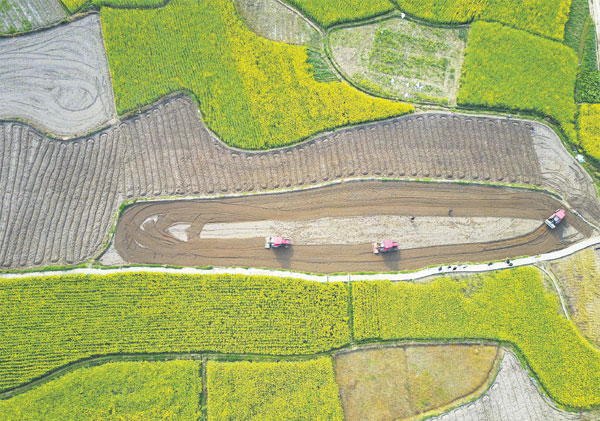Cultivating prosperity
|
LARGE FARM MACHINES work in Jianhe county, Guizhou province, in February. Provided to China Daily |
Land rights reform
China's farms are very small, even compared with other densely populated Asian countries. They average about 0.65 hectares versus 1.3 in India and 0.97 in Indonesia. However, Chinese farms are about twice as productive as Indian farms, though significantly less so than European or US farms. Structural reforms now focus on providing institutional and legal support for the creation of larger, more efficient farms while providing stability, fairness and security to rural residents.
During a 2016 visit to Xiaogang village in East China's Anhui province, where a group of farmers kicked off China's reforms in 1978 by dividing communal land into better managed family plots, President Xi said that the key to agricultural reform is "to respect the wishes of farmers, protect their interests and ensure grain production". As reported by Xinhua, he stressed that the reform should stick to the collective ownership of land, adhere to the fundamental status of household management and keep the land-contract relationship stable.
Rural land rights are divisible into three: Basic ownership rights will continue to be collectively held. Contract rights, held by families or individuals, will be strengthened by giving the farmers certified and documented contracts that can be continued by their heirs. Finally, operational rights can be leased by other farmers or by corporations.
Professor Huang Jikun, director of the China Center for Agricultural Policy at Peking University, says: "This system of three kinds of rights is the best way for China to achieve both equity and efficiency. We don't want complete property rights because we need a social safety net. We don't want people out on the street with no job. But contract rights are, from the farmers' view, almost equal to ownership." Key to this is the process of providing certificates to give legal certainty to farmers' rights.
"At the same time," he continues, "renting out land allows the more efficient farmers to put together larger farms."
Towns and counties have established leasing centers that stamp documents that formalize the contract, giving security to both sides. This sets a transparent market price, compared with the previous informal leasing arrangements.
Improving rights certainty obviously increases the willingness to invest. According to a 2011 survey by Landesa, Renmin University of China and Michigan State University, 76.5 percent of farmers say they are more likely to make investments if they have all law-compliant certificates. Around 80 percent of investments were made in the year after the farmer received the needed documents.
Eliste, of the World Bank, says: "Maintaining control of their plots has been less of a concern for the farmers since the start of formal registration, so farmers feel more secure in their user rights. China's 2015 fiscal reform removed pressure on local governments to raise income by selling land."
According to Zheng Fengtian, professor of agricultural economics at Renmin University of China: "It is not so hard for farmers to enlarge their farms. The question can solve itself. They rent their neighbors' land. More than 30 percent, almost 40 percent, of the land is now rented. In the next two years this may reach 50 percent."

















